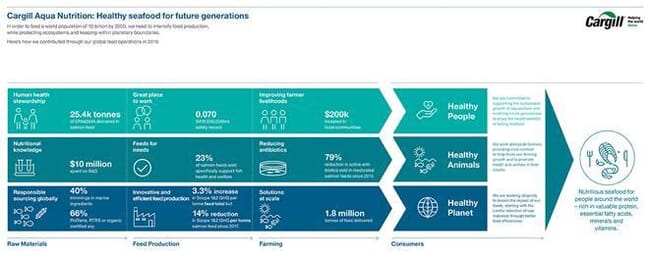
Click on the image to view in more detail © Cargill
According to Pilar Cruz, president of Cargill’s aqua nutrition business, the report, which covers the company’s activities in 2019, highlights the importance of collaboration in delivering transformational change.
“In order to understand and share awareness of the key issues, we talk to a broad range of stakeholders about the challenges and opportunities faced by the aquaculture industry in the different regions where we operate. These discussions help us identify areas of interest and collaboration – including communication, measurement and reporting, and sustainable raw materials.”
Projects flagged up in the Cargill Aqua Nutrition 2019 Sustainability Report include:
Improving salmon farm performance in Norway
Cargill highlighted the performance of salmon grown by Eide Fjordbruk when fed their EWOS Rapid Max diet. According to the report this allowed the Norwegian farmer to produce 5,700 tonnes of fish from smolt in only nine months. The reduced time at sea helped to reduce the impact of sea lice, mortalities and biomass loss by almost two thirds, improving feed conversion by 8-12 percent compared to average. Moreover, the use of the diets reduced phosphorus use by 6 tonnes, protein consumption by 300 tonnes, and GHG emissions equivalent to taking about 170 cars off the road for a year. All of this was done at a cost saving for the farmer, who needed less feed for his operations.
Supporting growth in insect meal production
The report detials how Cargill has partnered with InnovaFeed to use byproducts from a Cargill wheat processing mill to feed black soldier fly larvae. Production has scaled up, enabling Cargill to supply feed containing insect meal to a major salmon farmer. In 2020, InnovaFeed will open its 20,000 tonne per year production facility in France.
Supporting farmer livelihood
According to a February 2019 UN Special Report on the Right to Food, more than 80 percent of global aquaculture production is from small-to-medium-sized farmers. In 2019, the report notes, Cargill provided advice and support to more than 5,000 seafood farmers and workers in Thailand and Vietnam, through local workshops and mobile lab services.
Building bridges with communities
In Thailand, Cargill joined the Seafood Task Force to improve conditions in the fishmeal supply chain, and in April 2019 Cargill joined the Global Salmon Initiative (GSI) project Salmón Social in Chile to develop a code of practices to improve the social and environmental standards of its partners’ operations. The code was based on the Aquaculture Stewardship Council (ASC) certification framework and the implementation of the ‘Toolbox for a Responsible Relationship in Communities’ from WWF Chile, Rabobank and Consensus Building Institute.
Improving sustainability of reduction fisheries
Cargill refers to its goal to source marine ingredients only from sustainably managed fisheries by 2025. Fishery Improvement Projects (FIPs) have proved to be effective ways of bringing fishery stakeholders together to develop sustainable management procedures. Cargill continues to engage with FIPs in Peru and Thailand and encourage suppliers to form more FIPs. In 2019, 9.2 percent of Cargill’s forage fish came from FIPs, highlighting the company’s support of suppliers’ developments. This year the company will focus on building a coalition of stakeholders to ensure quotas are set for Northeast Atlantic stocks of blue whiting, herring and mackerel for the first time in five years.
Working with shrimp farmers to detect diseases
Cargill’s report points to the deployment of its SmartPCR, which uses molecular tools to allow multiple, specific detection of 3 to 4 pathogens within 5 hours. This allows farmers to adjust the feeding strategy to diets designed to boost immunity, thereby improving survival rates and performance.




